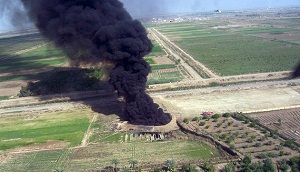War Related Illness and Injury Study Center
Oil Well Fires
 |
Service members who served in regions where oil wells and oil refineries were present may encounter smoke from burning oil fires. During Operation Desert Storm (1991), Iraqi forces damaged and set aflame hundreds of oil wells in Kuwait, creating an environmental hazard for troops who were nearby.
Oil well fire smoke often contains soot particles made of carbon from burning oil. Other particles may be mixed in the smoke such as sand, dust, and dirt. Burning oil fires also give off gases including carbon dioxide, carbon monoxide, sulfur oxide, nitrogen oxides, volatile organic hydrocarbons (e.g. benzene), hydrogen sulfide, and acidic gases.
Environmental studies conducted in Saudi Arabia and Kuwait during 1991 demonstrated that pollutants, other than particulates, were comparable or lower than what is found in major urban centers. Particulate levels, however, were much higher than those found in the United States, with Gulf War particulates measured at levels 3-6 times higher than the annual US standard *.
Health effects related to oil well fire smoke exposure depend on the nature of the gases and particles inhaled, how long the exposure lasted, and how close personnel were to the fire and smoke.
The body's natural defenses often are very successful at clearing these pollutants from the body (i.e., through coughing and sneezing). Acute or short term health effects may include:
- Runny nose
- Cough
- Shortness of breath
- Irritation of the eyes, nose, and throat
- Worsening of asthma or sinus conditions
Research studies have not shown consistent and definitive long-term health effects from oil well fire smoke exposure. However, one study on Gulf War Veterans did find an association between exposure to high levels of oil fire smoke and asthma. This study was limited because it did not take into account Veterans' medical histories, and the authors concluded that future research is necessary for more conclusive findings. Individuals most at risk for long term and chronic health effects are:
- Individuals who have a prior history of breathing problems
- Individuals who are exposed to high levels of oil fire smoke particles
- Individuals who experienced acute symptoms at the time of exposure
If you are concerned about exposure to oil well smoke, talk to your primary care provider. Work together as a team to see if any further follow-up testing is indicated.
Disclaimer
*Links will take you outside of the Department of Veterans Affairs web site. VA does not endorse and is not responsible for the content of the linked websites.



















